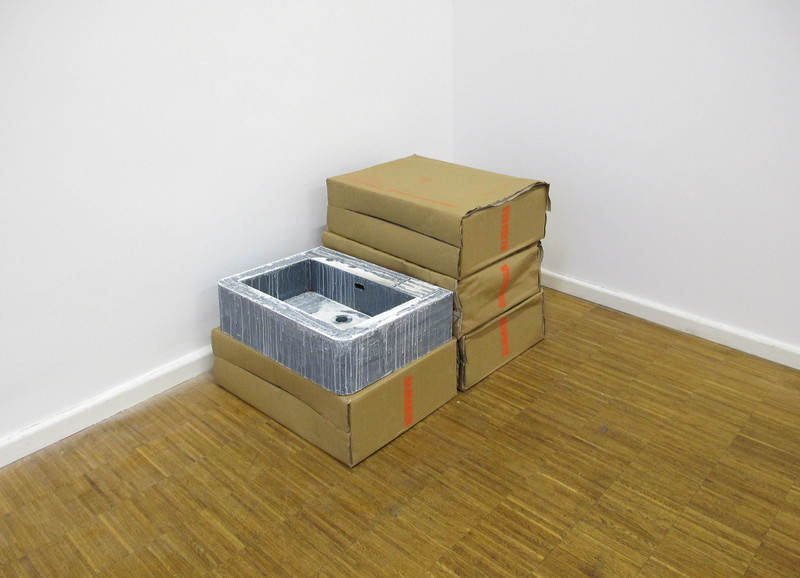Benjamin Greber
25 Feb - 31 Mar 2012
BENJAMIN GREBER
Dolores’ Lavatorium
Curator for Dolores: Dorothé Orczyk
25 February - 31 March, 2012
Benjamin Greber researches contemporary society as if he were an anthropologist. By reproducing technical objects, or ‘fictional ready-mades’ as he likes to call these, Greber reflects upon certain temporal processes taking shape in our society. In his work, the artist investigates technical objects and questions their value.
When producing the elements for his installations Greber uses a strict process to reproduce the actual industrially produced equivalent. He starts with a basic model in cardboard, which is painted and coated with an epoxy resin. In the next step, the object’s surface is manipulated by mimicking real life processes like staining, damaging, repairing, and repainting the object. The composition of traces of these physical processes combined with precise painterly interventions show the object in various stages of its existence. This idea takes further root by showing the same object in a series of exhibitions, each time in a different stage.
By applying these methods Greber wants the sculptures to be charged with a ‘narrative aura’ which raises questions about the origin, sense, past and future of these reproduced objects and their context.
I think everyone has an image of each object in mind which is associated with metaphors made by our social experiences with this object. By transforming those existing objects into sculptures this may reveal metaphors and its inner meanings to our lives.
In the Dolores’ Lavatorium exhibition, different stages in the process of installing and deinstalling a series of sinks is shown. The traces of both past, current, and future events refer to the perishability of the world and our comprehension of how things should appear. It is never clear which stage has already passed and which is yet to come. The first trace is that of the positioning of the sinks on the wall. The second set of traces is formed by fragments of the sinks spread on the floor, as if the sinks are taken from the wall and have been destroyed. The third trace of their existence take shape in a pile of transport boxes, either containing new sinks, or left over from the previous instalment.
Benjamin Greber (Germany, 1979) graduated at Kunstakademie Münster. Recent exhibitions include among others Marta Herford, Wilhelm-Hack-Museum, Ludwigshafen, NICC in Antwerp and Lokaal 01. Last year Greber was granted the Stiftung Kunstfonds Art Grant.
Dolores’ Lavatorium
Curator for Dolores: Dorothé Orczyk
25 February - 31 March, 2012
Benjamin Greber researches contemporary society as if he were an anthropologist. By reproducing technical objects, or ‘fictional ready-mades’ as he likes to call these, Greber reflects upon certain temporal processes taking shape in our society. In his work, the artist investigates technical objects and questions their value.
When producing the elements for his installations Greber uses a strict process to reproduce the actual industrially produced equivalent. He starts with a basic model in cardboard, which is painted and coated with an epoxy resin. In the next step, the object’s surface is manipulated by mimicking real life processes like staining, damaging, repairing, and repainting the object. The composition of traces of these physical processes combined with precise painterly interventions show the object in various stages of its existence. This idea takes further root by showing the same object in a series of exhibitions, each time in a different stage.
By applying these methods Greber wants the sculptures to be charged with a ‘narrative aura’ which raises questions about the origin, sense, past and future of these reproduced objects and their context.
I think everyone has an image of each object in mind which is associated with metaphors made by our social experiences with this object. By transforming those existing objects into sculptures this may reveal metaphors and its inner meanings to our lives.
In the Dolores’ Lavatorium exhibition, different stages in the process of installing and deinstalling a series of sinks is shown. The traces of both past, current, and future events refer to the perishability of the world and our comprehension of how things should appear. It is never clear which stage has already passed and which is yet to come. The first trace is that of the positioning of the sinks on the wall. The second set of traces is formed by fragments of the sinks spread on the floor, as if the sinks are taken from the wall and have been destroyed. The third trace of their existence take shape in a pile of transport boxes, either containing new sinks, or left over from the previous instalment.
Benjamin Greber (Germany, 1979) graduated at Kunstakademie Münster. Recent exhibitions include among others Marta Herford, Wilhelm-Hack-Museum, Ludwigshafen, NICC in Antwerp and Lokaal 01. Last year Greber was granted the Stiftung Kunstfonds Art Grant.

